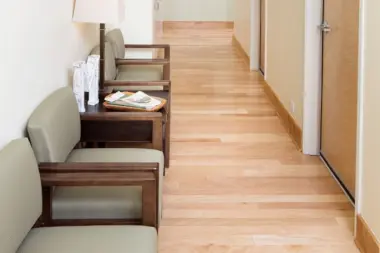About Monte Nido Philadelphia
SUD comes into play here because sometimes people will develop co-occurring addictions when they have an eating disorder as a way to keep their weight down. They might also turn to substances to help deal with the trauma or stress they’re going through due to the disorder.
They support dual diagnosis patients who are in recovery but they don’t outright treat SUD here. Co-occurring conditions require a comprehensive treatment plan and they look to address all of these needs at the same time.
They offer day support that uses clinical, medical, psychiatric and nutritional guidance to help you through the challenges of an eating disorder and what comes with it. They treat both male and female adults and adolescents.
This program is available for those who graduated from the Monte Nido Residential Living program and people still in outpatient therapy who need continued care. They look to help patients change their relationships with food and adjust disordered attitudes and behaviors.
They also work with you to identify harmful patterns during recovery and teach you about relapse prevention. They encourage families to get involved in your recovery process too.
Former patients have said they felt safe and built connections while there and the program helped them through depressive episodes. They say reatment was phenomenal and the staff was super qualified and effective.
Latest Reviews
Rehab Score
Gallery








Other Forms of Payment
Private insurance refers to any kind of healthcare coverage that isn't from the state or federal government. This includes individual and family plans offered by an employer or purchased from the Insurance Marketplace. Every plan will have different requirements and out of pocket costs so be sure to get the full details before you start treatment.
Self-pay involves paying for treatment out of your own pocket. You can use savings or credit, get a personal loan, or receive help from family and friends to fund your treatment. If you don't have insurance or your insurance plan doesn't cover a specific program, self-pay can help ensure you still get the care you need.
Addiction Treatments
Levels of Care
Residential treatment programs are those that offer housing and meals in addition to substance abuse treatment. Rehab facilities that offer residential treatment allow patients to focus solely on recovery, in an environment totally separate from their lives. Some rehab centers specialize in short-term residential treatment (a few days to a week or two), while others solely provide treatment on a long-term basis (several weeks to months). Some offer both, and tailor treatment to the patient's individual requirements.
Intensive Outpatient Programs (IOP) are for those who want or need a very structured treatment program but who also wish to live at home and continue with certain responsibilities (such as work or school). IOP substance abuse treatment programs vary in duration and intensity, and certain outpatient rehab centers will offer individualized treatment programs.
With a partial hospitalization program (PHP), you can participate in intensive rehabilitation treatment with the ability to return home at the end of the day. For a weekly minimum of 20 hours, a partial hospitalization program can take place up to 5 days a week for an average of 90 days. During PHP treatment, you can receive relapse prevention strategies, medication management, individual and group therapy, and other behavioral therapy interventions.
Because the severity of withdrawal symptoms can fluctuate, constant monitoring under 24-hour clinical care in Pennsylvania is recommended for early recovery. As you undergo detox, medical staff will supervise your health and ensure severe symptoms do not develop or threaten your life. Professional counselors will also be available to treat mental and emotional health needs.
Treatments
Co-occurring presentations such as substance abuse and trauma reactions like PTSD, share common causal and maintaining factors with eating disorders that influence treatment and recovery. At Monte Nido, they believe thoroughly assessing and treating co-occurring issues will substantially improve the chances of becoming fully and sustainably recovered. This programming focuses on stabilizing eating disorder, substance use and PTSD symptomatology; reducing urges, enhancing motivation, developing alternative coping capacities and changing the way clients think about themselves and their world. The treatment includes CBT, DBT, CPT (Cognitive Processing Therapy) and more.
Mental health rehabs focus on helping individuals recover from mental illnesses like bipolar disorder, clinical depression, anxiety disorders, schizophrenia, and more. Mental health professionals at these facilities are trained to understand and treat mental health issues, both in individual and group settings.
Programs
Adult rehab programs include therapies tailored to each client's specific needs, goals, and recovery progress. They are tailored to the specific challenges adult clients may face, including family and work pressures and commitments. From inpatient and residential treatment to various levels of outpatient services, there are many options available. Some facilities also help adults work through co-occurring conditions, like anxiety, that can accompany addiction.
Young adulthood can be an exciting, yet difficult, time of transition. Individuals in their late teens to mid-20s face unique stressors related to school, jobs, families, and social circles, which can lead to a rise in substance use. Rehab centers with dedicated young adult programs will include activities and amenities that cater to this age group, with an emphasis on specialized counseling, peer socialization, and ongoing aftercare.
Clinical Services
Cognitive Behavioral Therapy (CBT) is a therapy modality that focuses on the relationship between one's thoughts, feelings, and behaviors. It is used to establish and allow for healthy responses to thoughts and feelings (instead of unhealthy responses, like using drugs or alcohol). CBT has been proven effective for recovering addicts of all kinds, and is used to strengthen a patient's own self-awareness and ability to self-regulate. CBT allows individuals to monitor their own emotional state, become more adept at communicating with others, and manage stress without needing to engage in substance abuse.
Dialectical Behavior Therapy (DBT) is a modified form of Cognitive Behavioral Therapy (CBT), a treatment designed to help people understand and ultimately affect the relationship between their thoughts, feelings, and behaviors. DBT is often used for individuals who struggle with self-harm behaviors, such as self-mutilation (cutting) and suicidal thoughts, urges, or attempts. It has been proven clinically effective for those who struggle with out-of-control emotions and mental health illnesses like Borderline Personality Disorder.
Group therapy is any therapeutic work that happens in a group (not one-on-one). There are a number of different group therapy modalities, including support groups, experiential therapy, psycho-education, and more. Group therapy involves treatment as well as processing interaction between group members.
In individual therapy, a patient meets one-on-one with a trained psychologist or counselor. Therapy is a pivotal part of effective substance abuse treatment, as it often covers root causes of addiction, including challenges faced by the patient in their social, family, and work/school life.
The goal of nutrition therapy is to help you understand how your diet affects your overall health. It teaches you healthy eating habits, which speed up your recovery and give you the nutrients you need for long term physical and mental health.
Amenities
-
Private Setting
Staff & Accreditations
Staff

Cassie McLean, MPA
CEO

Giulia Peterlongo, MBA
COO

Molly Perlman, MD, MPH, CEDS-C
Chief Medical Officer

Giulia Suro, PhD, CEDS
Director of Research and Clinical Outcomes

Brandie Kalinowski, MBA
Chief People Officer

Anthony Modano
Chief Marketing Officer

Britni Swayzee, RN, RWR
Director of Nursing

Jason Schulz
CFO
Accreditations

The Joint Commission, formerly known as JCAHO, is a nonprofit organization that accredits rehab organizations and programs. Founded in 1951, the Joint Commision's mission is to improve the quality of patient care and demonstrating the quality of patient care.
Joint Commission Accreditation: Yes
Contact Information
789 Lancaster Ave
Villanova PA, 19085